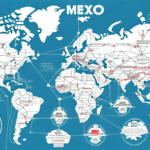What Is a Carrier in Shipping? A Comprehensive Guide
If you’re involved in any kind of shipping, you’ve almost certainly heard the term “carrier” before. But what exactly is a carrier in the world of shipping, and what role do they play in facilitating the movement of goods around the world? In this comprehensive guide, we’ll explore the different types of carriers, their histories, the pros and cons of working with each, and much more.
The Different Types of Carriers in Shipping
There are several different types of carriers in shipping, each with their own unique characteristics and strengths. Some of the most common include:
- Container ships
- Bulk carriers
- Tankers
- Ro-Ro ships
- General cargo ships
Aside from the aforementioned types of carriers, there are also specialized ships that cater to specific types of cargo. For instance, livestock carriers are designed to transport live animals such as cattle, sheep, and horses. These ships are equipped with facilities that ensure the comfort and safety of the animals during transport.
Another type of specialized carrier is the heavy-lift ship, which is used to transport oversized and heavy cargo that cannot be accommodated by regular container or bulk carrier ships. Heavy-lift ships are equipped with cranes and other heavy-lifting equipment that can handle loads weighing up to several hundred tons.
Understanding the Role of a Carrier in Shipping
At its most basic level, a carrier is any company or organization responsible for physically transporting goods from one location to another. This encompasses everything from container ships and trucks to airplanes and trains.
Carriers generally offer a range of services, including loading and unloading cargo, transportation, and storage. Some carriers specialize in particular modes of transport, while others offer a range of services.
One of the key responsibilities of a carrier is to ensure that the goods being transported are handled with care and arrive at their destination in good condition. This involves taking measures to protect the cargo from damage during transit, such as using appropriate packaging and securing the goods properly.
In addition to physical transportation, carriers also play a crucial role in managing the logistics of shipping. This includes coordinating with other parties involved in the supply chain, such as customs brokers and freight forwarders, to ensure that all necessary documentation is in order and that the goods are cleared for transport.
How Carriers Help Facilitate Global Trade
In today’s interconnected world, international trade is more important than ever. Carriers play a critical role in making this trade possible. Without carriers, it would be impossible to move goods across vast distances and between different countries. As such, they are essential for the global economy.
Carriers help to facilitate global trade in a number of ways. For example, they make it possible for businesses to source raw materials from other countries or to sell their products to customers in different parts of the world. They also help to create jobs and economic growth in countries around the world.
In addition to facilitating global trade, carriers also play a crucial role in ensuring the safety and security of goods during transportation. They use advanced technology and security measures to protect goods from theft, damage, and other risks. This is especially important for high-value goods such as electronics, pharmaceuticals, and luxury items. Carriers also comply with international regulations and standards to ensure that goods are transported safely and legally across borders.
The History and Evolution of Shipping Carriers
Shipping carriers have been around for centuries, with the earliest carriers using sailboats to transport goods around the Mediterranean. Over time, carriers have evolved significantly, with the introduction of steamships in the 19th century and the rise of containerization in the 20th century.
Today, carriers continue to evolve with the introduction of new technologies such as automation and artificial intelligence. These developments are helping to make shipping faster, more efficient, and more cost-effective than ever before.
One of the most significant changes in the shipping industry in recent years has been the shift towards eco-friendly practices. With concerns about climate change and environmental impact, many carriers are now investing in cleaner, more sustainable technologies. This includes the use of alternative fuels such as biofuels and hydrogen, as well as the development of more efficient shipping routes to reduce emissions.
Another trend in the shipping industry is the increasing focus on transparency and traceability. Customers are demanding more information about the products they are buying, including where they come from and how they were transported. To meet this demand, many carriers are now using blockchain technology to create secure, tamper-proof records of every step in the shipping process, from origin to destination.
Key Terms and Concepts to Know When Discussing Carriers in Shipping
When discussing carriers in shipping, it’s important to be familiar with some key terms and concepts. These might include:
- Freight forwarder
- Logistics
- Containerization
- B/L (Bill of Lading)
- Intermodal transport
Another important concept to understand when discussing carriers in shipping is the difference between a carrier and a freight forwarder. While a carrier is responsible for physically transporting the goods, a freight forwarder acts as an intermediary between the shipper and carrier, helping to arrange the shipment and handle the necessary paperwork. It’s also important to note that carriers can specialize in different types of shipments, such as air freight or ocean freight, and may have different regulations and requirements depending on the mode of transportation.
The Pros and Cons of Working with Various Types of Shipping Carriers
Each type of shipping carrier comes with its own set of advantages and disadvantages. For example:
- Container ships offer large capacity but can be slower and restricted by port access.
- Air freight is fast but more expensive and limited in carrying heavy loads.
- Trucking provides door-to-door service but can be less efficient for long distances.
Factors to Consider When Choosing a Carrier for Your Shipment
When choosing a carrier for your shipment, there are several factors to consider. These might include:
- The nature and size of the cargo
- Delivery time requirements
- Cost considerations
- Carrier reliability and reputation
- Special handling or regulatory requirements
How Technology is Transforming the Shipping Industry and the Role of Carriers
Technology is having a huge impact on the shipping industry, and carriers are at the forefront of this transformation. Automated systems, artificial intelligence, and blockchain technology are all helping to make shipping faster, more efficient, and more transparent.
For carriers, this means new opportunities to streamline their operations, reduce costs, and provide better services to their customers. However, it also means adapting to new technologies and finding ways to stay ahead of the competition.
Regulations and Compliance Requirements for Shipping Carriers
There are a variety of regulations and compliance requirements that carriers must adhere to in order to operate legally and safely. These might include safety regulations for ships and transportation vehicles, environmental regulations, and customs regulations for international shipping.
Failure to comply with these regulations can result in fines, legal action, and reputational damage for carriers. As such, it’s important for carriers to stay up-to-date with the latest requirements and maintain a culture of compliance within their organizations.
Common Challenges Faced by Carriers and How They Overcome Them
Like any industry, shipping comes with its fair share of challenges. Some of the most common challenges faced by carriers include:
- Delays due to weather or port congestion
- Security threats and cargo theft
- Regulatory compliance and documentation
- Fluctuations in fuel prices
To overcome these challenges, carriers must be innovative, resilient, and adaptable. This might involve investing in new technologies, improving efficiency, or finding creative solutions to complex problems.
The Future of Shipping and What It Means for Carriers
The shipping industry is constantly evolving, and carriers must stay ahead of the curve in order to remain competitive. Some of the key trends shaping the future of shipping include:
- Increased use of automation and AI
- Greater emphasis on sustainability and eco-friendly practices
- The rise of e-commerce and faster delivery expectations
For carriers, this means preparing for a future where technology and sustainability are key drivers of success. It also means being ready to adapt to changing global dynamics and take advantage of new opportunities as they arise.
Conclusion
Carriers are a critical component of the shipping industry, facilitating global trade and ensuring that goods can be transported quickly and efficiently around the world. However, there is much to consider when choosing a carrier, and it’s important to stay up-to-date with the latest developments and trends in the industry. By doing so, businesses can ensure that they are choosing the right carrier for their needs and taking advantage of all the benefits that shipping has to offer.






















